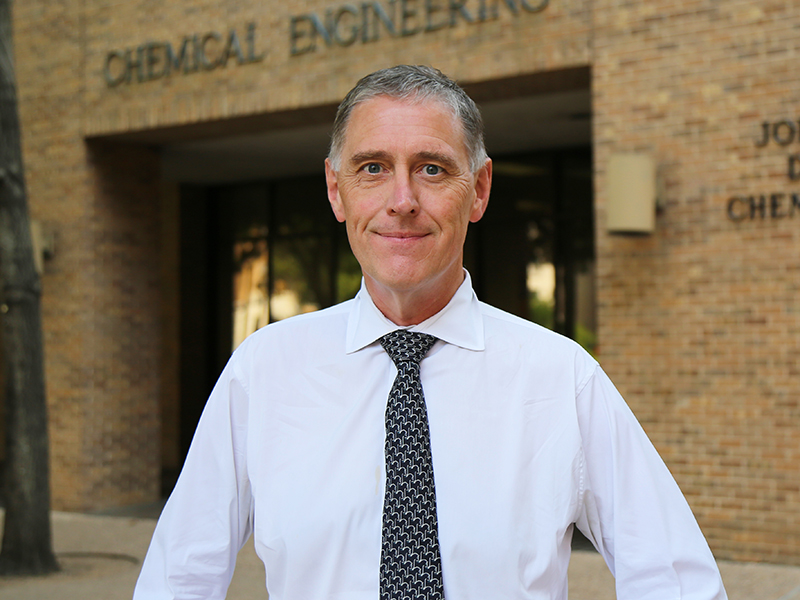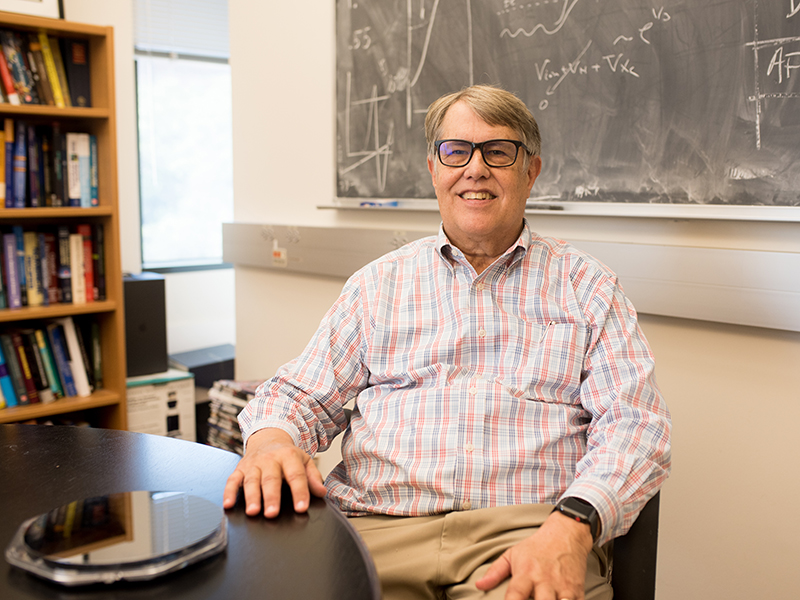Chemical engineers Joan Brennecke, Benny Freeman and James Chelikowsky are among the recipients of the TAMEST (Texas Academy of Medicine, Engineering, Science and Technology) and Lyda Hill Philanthropies 2025 Hill Prizes.

Joan Brennecke, professor in the Cockrell School of Engineering’s McKetta Department of Chemical Engineering
The prizes in six categories propel high-risk, high-reward ideas and innovations that demonstrate significant potential for real-world impact and can lead to new, paradigm-shifting paths in research. The prizes are given in six categories: medicine, public health, engineering, biological sciences, physical sciences and technology. Each winner receives $500,000 in funding to advance groundbreaking science in Texas.
“It is exciting that the work of professors Brennecke, Freeman and Chelikowsy is being recognized by TAMEST. The Hill Prizes offer a unique opportunity for each to further their impacts on a grand scale by developing more energy efficient processes and discovering materials that can circumvent vulnerable supply chains to improve our energy security,” said Delia Milliron, chair of the Cockrell School of Engineering’s McKetta Department of Chemical Engineering.
2025 Hill Prize in Engineering: Joan Frances Brennecke

Benny Freeman, professor in the Cockrell School of Engineering’s McKetta Department of Chemical Engineering
Brennecke and her co-PI Freeman’s proposal was chosen for the 2025 Hill Prize in Engineering to develop advanced, stable and energy-efficient membrane technology to separate olefins (such as ethylene and propylene) from paraffins, a process crucial in many industries including petrochemicals. Global olefin production exceeds 200 million tonnes annually, or 30 kg per person, and is used to produce plastics, pharmaceuticals, medical tubing, diapers, detergents, antifreeze, food containers, and more. The current method of olefin purification is highly energy-intensive and can be a very challenging process. Building on a recent breakthrough in chemically stable facilitated transport membranes, Brennecke and Freeman will utilize the prize funding to create robust thin-film composite membranes with improved performance for commercial applications. This investment will enable their team to explore innovative approaches to enhance membrane performance, establish robust manufacturing processes and collaborate with industry partners to bring this groundbreaking technology to market. This process promises to significantly reduce global energy consumption and CO2 emissions, equivalent to removing 18 million cars from the road, and has the potential to be a major step in de-carbonizing the chemical industry.
2025 Hill Prize in Physical Sciences: James Chelikowsky

James Chelikowsky, professor in the Cockrell School of Engineering’s McKetta Department of Chemical Engineering
Chelikowsky, who is a professor of physics, chemical engineering and part of the Oden Institute for Computational Engineering and Sciences, has been awarded the 2025 Hill Prize in Physical Sciences for his innovative approach to designing and discovering permanent magnets. The development of energy materials for green technologies, such as electric vehicles and renewable energy systems, heavily depends on rare earth elements (REEs) for permanent magnets. However, the inclusion of REEs often faces secure supply chain issues. Additionally, the scarcity of REEs, such as neodymium (Nd) and dysprosium (Dy), poses a significant challenge for scaling up technologies like wind turbines. To address this, Chelikowsky and his team at The University of Texas at Austin will collaborate with researchers at The University of Texas at Arlington. They will leverage artificial intelligence, quantum simulations and experimental techniques to design and discover non-rare-earth (REE) abundant permanent magnets. The team will use the prize to explore promising alternatives that exhibit comparable magnetic properties to traditional REE-based magnets. Their approach could significantly impact energy security and accelerate the transition to sustainable energy solutions.
“It is with great pride that I congratulate this year’s Hill Prizes recipients. Their innovation is remarkable, as is their unwavering dedication to creating game-changing discoveries that address such crucial issues in our society. Their contributions are a testament to their talent and perseverance, and I look forward to seeing how these prizes will support their efforts to shape a better and brighter tomorrow for us all.”
Lyda HillFounder, Lyda Hill Philanthropies
TAMEST was founded in 2004. It comprises Texas-based members of the three National Academies (National Academy of Medicine, National Academy of Engineering and National Academy of Sciences) and other honorific organizations. TAMEST brings together the state’s brightest minds in medicine, engineering, science and technology to foster collaboration, and to advance research, innovation and business in Texas.
Leaders of the winning groups will be recognized Feb. 4, at the opening reception of the TAMEST 2025 Annual Conference in Irving. Each recipient will submit an annual impact report to TAMEST and Lyda Hill Philanthropies to showcase their progress and highlight how the prize has accelerated their research.
Applications for the 2026 Hill Prizes will open May 1, 2025.
